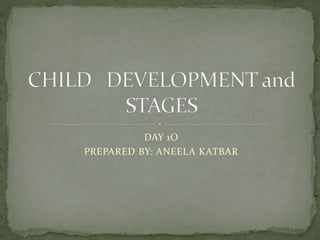CHILD DEVELPMENT DAY10.pptx
- 1. DAY 1O PREPARED BY: ANEELA KATBAR
- 2. ÔÇó Understand child development and its stages ÔÇó Explan its importance in teaching and learning ÔÇó Discuss student learning disabilities.
- 3. ACTIVITIES DURATION Recitation of Holy Quran Share reflections on professional learning of the previous day Share day objectives Brainstorm notion of child development followed by MT’s Input 09:00am to 11:00am BREAK 11:00am to 11:30am Discuss the stages of child development Discuss student learning disabilities 11:30am to 1:30pm Recap of the Day 1:30pm to 2.00pm
- 4.  Physical – measured by height/weight   Cognitive – thinking/intellectual growth  Psychosocial – relationships/relations/communication
- 5. ÔÇó Brain and Nervous System: ÔÇó The infant's experiences help to "fine-tune" the brain's responses to stimulation. ÔÇó Motor Abilities Brain maturation allows the development of motor skills from reflexes to coordinated motor abilities, including grasping and walking.
- 6.  Cognitive Skills: The infant progresses from knowing his or her world only through immediate experiences that helps her to "experiment"  Language :Babies’ cry is his or her first language
- 7. 1.Personality Development : ÔÇó The infant's transition from total dependence to increasing INDEPENDENCE. 2.Understanding Self and Others: ÔÇó Much more attentive to the reactions of others. Parent- Parent-Infant 3. Interaction : ÔÇó Infant Interaction Parents and infants respond to each other first by synchronizing their behavior.
- 9. ÔÇó Most rapid year period of growth throughout the life span. ÔÇó Rolling over,sitting up, crawling, and walking are specific physical milestone ÔÇó Social milestone usually occurs during the period include development of sense of self awareness to the age of 12 months
- 10. ÔÇó 1. PHYSICAL DEVELOPMENT ÔÇó Brain and Nervous System The brain develops faster than any other part of the body, attaining 90 percent of its adult weight ÔÇó 2. Motor Abilities and Perception ÔÇó Large body movements, such as running and jumping, improve dramatically. Fine motor skills, such as writing and drawing, develop more slowly.
- 11. ÔÇó 3. COGNITIVE DEVELOPMENT ÔÇó Cognitive Skills : The child becomes increasingly able To use mental representation and SYMBOLS. ÔÇó Language: Language abilities develop rapidly; By age of 6, the average child knows 14,000 words and demonstrates extensive grammatical knowledge.
- 12. ÔÇó 4. PSYCHOSOCIAL DEVELOPMENT ÔÇó Personality Development The child to boldly and exuberantly initiates new activities. ÔÇó Understanding Self and Others Parent They engage in increasingly complex and imaginative types of play, sometimes by them selves and, increasingly, with others. ÔÇó Child Interaction As children become more independent and try to exercise more control over their environment, the parents' role in supervising the child's activities becomes more difficult.
- 13. ÔÇó PHYSICAL DEVELOPMENT ÔÇó Growth : Increased strength and heart and lung capacity give children the endurance to improve their performance in skills such as swimming and running. ÔÇó Motor Skills :Slower growth might contribute to children's increasing control over their bodies.














